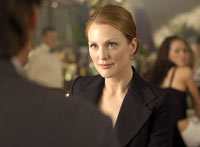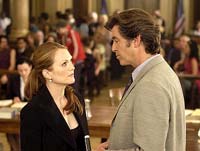 |
From the opening line of Laws of Attraction, you feel for leading lady Audrey Woods (Julianne Moore). As this top NYC divorce attorney researches a case, her mother gives her the stale, condescending advice, “If you made more of an effort, you actually might get a man.” And moments later, just before going into the courtroom to argue said case, we see Audrey hiding in a ladies room stall snarfing a Sno Ball snack cake and giving herself a pep talk. What woman hasn’t retreated to a public bathroom for a moment of self-solace before a stressful encounter? We appear to have the all the makings of a delightful chick flick here—a dysfunctional mother, a neurotic leading lady, a seemingly well-ordered life ever so in need of a little romance.

When Audrey steps into the courtroom, her soon-to-be-arch-nemesis Daniel Rafferty (Pierce Brosnan) is asleep in the opposing counsel’s chair. She sticks a pencil in his ear to wake him up (must be a litigator thing). While time-honored wisdom says the way to a man’s heart is through his stomach, for dashingly disheveled Daniel, apparently it’s through his ear canal instead, because from that moment on, he relentlessly pursues his red-headed rival. The rest of the plot basically revolves around their cat-and-mouse antics, both romantically and professionally.
Though Brosnan and Moore spar winningly as she rebuffs his constant advances, I still don’t buy the attraction. Why does Daniel like Audrey? While it could be argued as opposites attract—she’s an uptight, play-by-the rules romance atheist, and he’s an unmade bed of a man with unconventional courtroom antics and a closet belief in the power of love—Daniel barely has a chance to see Audrey’s yin to his yang before he’s mooning over her. Though there’s eventually nice chemistry between these two accomplished actors, there isn’t enough scripting early on to establish a believable basis for their romance. This is one of the main disappointments about this flick, and, admittedly, a common missing ingredient in modern romantic comedies.

Also disappointing is that after about ten minutes all initial sympathy for Audrey is gone, as her relatable quirkiness disintegrates into a one-dimensional caricature, who’s so uptight she not only has color-coded pens, she lines them up at a perfect angle on the courtroom table before the trial commences. She also often wears her hair in a bun and watches the Weather Channel for “fun.” At this point, the opening-line advice from her mom (Frances Fisher)—a multi-divorcee who’s had so much cosmetic work done she’s like a walking piece of Tupperware—seems pretty solid.
Audrey’s initial declaration to her mom and to Daniel that she doesn’t believe in dating and romance makes it all the more embarrassing when the two attorneys drink too much and wind up in bed together the next night, during what she perceives as a business meeting and he insists is a date. The morning after, Audrey’s mortified and Daniel’s pleased as punch. He even scribbles a few case notes on her panties to refer to during their courtroom brawl that day, giving a whole new meaning to the term “legal briefs.”

Things get really heated—and interesting—when the two represent opposing sides in the nasty divorce of English rock star Thorne Jamison (Michael Sheen) and his fashion designer wife, Serena (Parker Posey). While visiting the Irish castle the Jamisons both want possession of in the settlement, Audrey and Daniel once again drink too much at a small-town festival. You’d think two such intelligent professionals would have learned the first time, but once again their drunken state leads to drastic action: They get married—then hop into bed together. Audrey fears their nuptials will threaten their professional credibility, so the arch-rivals-turned-spouses agree to play house when they return to the U.S. At least until the conclusion of the Jamison case.
What ensues is a nod to Spencer Tracy and Katharine Hepburn in Adam’s Rib, as they begin to flirt covertly in the courtroom, passing notes about what’s for dinner and sharing smiles over their respective clients’ childish antics. It’s nice to watch Audrey finally unclench and to see Daniel in an ironed shirt at last. What also unfolds is a refreshing pro-marriage argument, as Daniel waxes eloquent about why you shouldn’t give up on a marriage “at the first hiccup” and wonders aloud where the passion displayed during nasty divorce proceedings is when couples first experience problems in their relationship.
Unfortunately, by the time we get to this great message, we’ve seen so much irresponsible drinking and casual sex it almost seems funny for Daniel to tread any moral high ground. And it’s tough to get over the fact he’s arguing for a marriage that was inspired by too much beer. We’ve also seen so many one-dimensional characters by this point—Audrey’s a type-A-plus, the Jamisons are clearly inspired by Courtney Love’s childish antics, the judge is channeling Judge Judy, Audrey’s mom is the stereotypical Botox-powered socialite divorcee—it’s difficult to take anyone on the screen seriously. It’s too bad, too, because there was potential here—the actors are winning, their chemistry compelling, the main plot twist intriguing, and the Irish countryside breathtaking. All of these elements deserve more than what they’re given here. In the end, lazy scriptwriting leads to a lukewarm verdict.
Talk About It
Discussion starters- The movie has been promoted as pro-marriage. Do you agree that the tone is pro-marriage overall? Why or why not? What messages does the movie send about marriage? Do you agree or disagree with these messages?
- Why do you think Audrey’s so jaded about love and marriage? Have you ever felt the same way?
- Audrey’s mom tells her she needs to make more of an effort to find love. Do you agree or disagree with her advice? How hard should singles work to find love and what role does God play in bringing couples together?
- Daniel’s character complains that many couples divorce at “the first hiccup” in their relationship and wonders why they don’t fight harder for their marriage. Do you agree with his assessment of the current approach to marriage and divorce in our culture? If so, what do you think has led us to this place, and what needs to change?
The Family Corner
For parents to considerThough the film contains pro-marriage arguments, it also contains premarital sex prompted by drunkenness—twice. And the drunkenness is prompted by some unfortunately named drinks. Also, a couple of the supporting characters use colorful language and engage in some childish and lewd behavior.
Photos © Copyright New Line Cinema
What Other Critics Are Saying
compiled by Jeffrey Overstreetfrom Film Forum, 05/06/04Taking a break from James Bond films, Pierce Brosnan tries his hand at another genre this week in Laws of Attraction. The result causes many critics to mention the comedies of Spencer Tracy and Katherine Hepburn, although most admit that Brosnan and Julianne Moore (Far from Heaven, Magnolia) would need a better script in order to compete with classics of the ’40s and ’50s.
Brosnan and Moore play Daniel and Audrey, divorce lawyers who face off in the courtroom over a particularly nasty dispute between a rock star and his fashion-designer wife. Outside the courtroom, their own romance is sparking to life, whether Audrey likes it or not.
While many mainstream critics approve of director Peter Howitt’s attempt to evoke the spirit of classic comedy, they find that it falls far short of its mark.
Christianity Today Movies recently featured interviews with Julianne Moore and Pierce Brosnan, in which they talk about the film’s old-fashioned style. But in spite of its nostalgic sense of restraint, the film is not restrained enough for some religious press critics. Personally, I was bothered by the film’s illogical turns and bored by its constantly predictable comedy.
Camerin Courtney (Christianity Today Movies) writes, “Though there’s eventually nice chemistry between these two accomplished actors, there isn’t enough scripting early on to establish a believable basis for their romance.” Courtney is impressed with its “refreshing pro-marriage argument,” but concludes, “By the time we get to this great message, we’ve seen so much irresponsible drinking and casual sex it almost seems funny for Daniel to tread any moral high ground. And it’s tough to get over the fact he’s arguing for a marriage that was inspired by too much beer. In the end, lazy scriptwriting leads to a lukewarm verdict.”
Gerri Pare (Catholic News Service) calls it a “visually appealing but underwhelming romantic comedy. It’s got a good message about commitment but it lags on laughs. At least it all comes down on accepting that marriage requires commitment and work, not to be discarded at the first hint of discontent.”
Annabelle Robertson (Crosswalk) says it offers “a much-needed message about the power of making marriage work, against all odds.” She goes on to criticize the behavior of the lead characters who hastily and drunkenly jump into bed together, but adds, “The acting throughout the film is superb. The script, though fairly predictable, has some very cute one-liners scattered throughout.”
Michael Elliott (Movie Parables) writes, “Laws of Attraction succeeds for no other reason than the fact that we like the two stars and the characters they portray. The chemistry works.”
Cliff Vaughn (Ethics Daily) says the film is appealing because the “opposing divorce attorneys … weigh whether to move beyond attraction to commitment.”
Phil Boatwright (Movie Reporter) says, “Those involved deserve an A+ for attempting to revive grown-up banter and sophisticated predicaments on the silver screen. Alas, I think I liked it more for what it was trying to be than for what it actually was.”
Chris Monroe (Christian Spotlight) says, “The overall effect of this story provides laughter and love—even correction—to the ugly cultural problem of divorce.”
While I agree that it is a rare and wonderful thing to see a movie that suggests marriage is a good thing, I’m still unimpressed with Laws of Attraction. The comedy is oh so predictable. The writing is uninspired. The supporting characters are flat stereotypes. And worst of all, the two lead characters are not in any way ready to consider something as ambitious and sacred as marriage.
I enjoyed the chemistry of Brosnan and Moore. But their characters exhibit such reckless behavior and self-absorption that I’m never convinced for a moment that they are really interested in each other. Daniel is drawn to Audrey’s appearance and personality quirks. Audrey seems drawn to Daniel because, well … why? His carpet of chest hair? Any good marriage counselor would look at these two and recommend a good deal of character development before they’d approve of a lifelong commitment. While the music and the movie conventions try to sway us into believing that they’re headed for “happily ever after,” all I see are fights, betrayals, lawsuits, and damage waiting around the corner.
My full review is at Looking Closer.
Copyright © 2004 Christianity Today. Click for reprint information.











